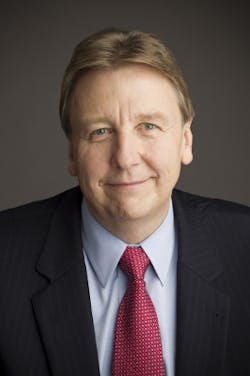Three Values Can Help You Retain the Best of the Best
It’s Business 101: improving the retention of both employees and clients is a powerful financial strategy. Keeping your best employees and clients takes far less time, effort and money than replacing them.
The value of retention, however, goes far beyond the hard, painful costs of replacing “the departed.” Retention enriches an organization’s culture and enhances its brand. Who wouldn’t want to associate with an organization that’s solid, stable and enduring and that has earned exceptional loyalty? That’s the kind of company you want to work for and do business with.
I’m fortunate to lead a company like that. We’re a large commercial property insurer that retains 95% of our clients every year, significantly above our industry average. More than half of our clients have been with us more than 25 years, with some longer than a century. Our employee retention rate is also high – more than 93% in 2014 – and our average employee tenure is 13 years. Like myself, many employees have spent their entire careers with us, and we feel really good about that.
Although settling on a retention strategy is easy, executing it is not. If you want to improve your retention, I’d suggest focusing on cultivating three qualities: loyalty, freedom and mutual respect.
Loyalty
One of the most meaningful ways to demonstrate loyalty to your employees is to promote from within if you can (if you can’t, that’s another column). I recently succeeded a CEO who had led the company since 1999. I moved up a slot on the organization chart, and so did 40 other employees. We’ve come a long way since our days as entry-level loss prevention engineers and underwriters.
On the client side, loyalty can be demonstrated in a lot of ways. For us, the fact that we specialize in only one thing, commercial property insurance, means we have to do it exceptionally well to garner the loyalty of clients. Stability goes hand in hand with this value. It means we have to pay claims quickly and fairly. Our promise to our clients and employees is that we won’t turn into a different company when disaster strikes. In terms of capital, responsiveness and client service, we were the same company the days after 9/11 and Hurricane Katrina that we were the days before these unfortunate events occurred.
Freedom
One way to liberate employees is to let them shape their own careers. For example, we offer full tuition reimbursement for any learning that is related to our unique mission of helping clients prevent property loss with sound engineering solutions. And we define “related” very expansively. Employees leap at this opportunity, using the tuition reimbursement to fill gaps, obtain higher degrees or take the company in new directions.
Freedom for clients means letting them control their destiny. Our 1,800 loss prevention engineers spend thousands of hours visiting client properties every year, evaluating their actual physical (vs. statistical) risk, explaining the hazards and offering solutions for risk improvement. Then our clients decide what action to take next. If you’re the one company still making your product after a hurricane hits, you’re glad you opted to pre-install $35,000 in generators to prevent a $100 million loss. You controlled your own destiny and grabbed new market share from your competitors in the process.
Mutual Respect
It’s easy for our clients to feel a sense of mutuality because as a mutual company, our clients are our owners. That means there is never a conflict between what is good for our clients and what is good for our owners; they are one and the same. But mutuality isn’t only about business models, it’s about people. Every single interaction with your clients needs to convey a genuine sense of your dedication to the partnership. This can make a profound effect on a client accustomed to being disappointed by vendors. Treat others as you want to be treated is a timeless principle because it works.
It’s the same with employees: give and take. For example, much has been made of the notion that many millennial employees lack loyalty to their employers. In fact, I recently had lunch with a new employee who said, “Our professors told us that if we’re not promoted within two years, we won’t advance and should look for a new place to work.”
I smiled, however, when he followed with, “It’s not that we want to switch jobs. We sometimes feel we have to. I want to keep growing, doing new things, trying new things and having a fair shot of being promoted when I deserve it. Yet I want stability, too, and I’m pretty sure I can have that here.” That was music to my ears.
Career investment is mutual. Millennial employees are learning from us more senior folks and we’re learning from them. We say to them, “If you’re not getting the feedback you need, help us. Tell us.”
What Goes Around
These are just a few simple examples of how loyalty, freedom and mutual respect can help you hold on to your best clients and employees.
Remember, retention builds on itself. Proven, long-term employees tend to be experts at satisfying clients. And having a stable, steadily growing client base is the consummate sign of a company where great employees want to stay.
Thomas A. Lawson is president and CEO of FM Global, one of the world’s largest commercial and industrial property insurers.

